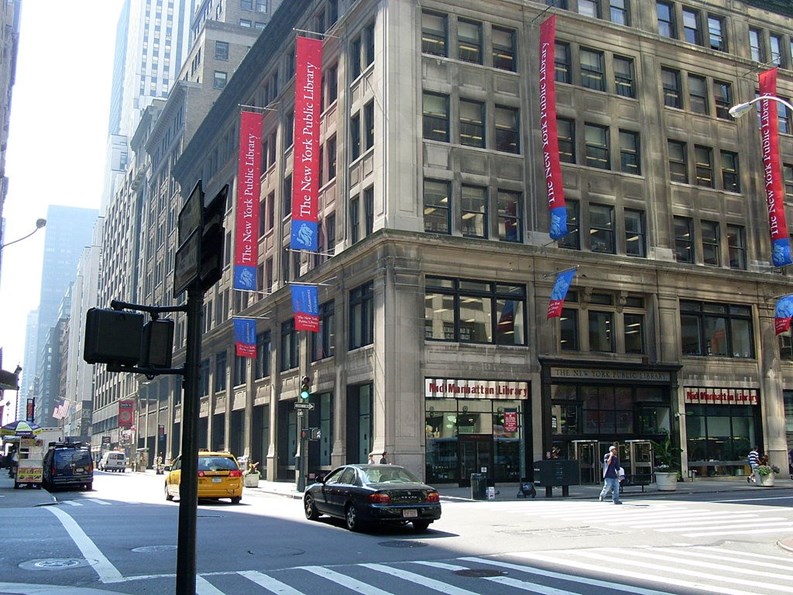The New York Public Library is undertaking a substantial renovation at its Mid-Manhattan branch on Fifth Avenue, to the tune of some $200 million. As the New York Daily News reported, the library closed on August 1 for a project that will last three years, and involve scaffolding that occupies a small park separating the library from the ritzy Fifth Avenue Tower condominium.
It now appears that the Library's renovation project has led to a legal fight between it and the condo. The Fifth Avenue Tower condo board has reportedly impeded the library from beginning the renovations by attempting to legally require the library to pay a $15,000 'inconvenience fee' each month, as well as a “substantial” penalty should the project last longer than 27 months. The board also aims to “force the library to take out a $20 million insurance policy in the condo board's name.”
"No one is forcing the (NYPL) to undertake a $200 million renovation," said attorney Alan Marder said in a filing, as quoted in the Daily News. "The petitioner is hardly a not-for-profit barely scraping by."
Meanwhile, the library's attorney has asserted that the board's demands are unreasonable, as scaffolding and sidewalk bridges are all pretty standard city fare.
So what, if any of this, is reasonable? Does the library have the right to undergo its renovations unhindered? Or is the board in the right and deserving of compensation for any inconvenience – aesthetic, logistical or otherwise – that it will endure during this not-insignificant period of time?
Shared Spaces
For starters, it’s worth establishing that, in the abstract, demands for insurance and even licensing fees are fairly standard practice in New York City real estate construction. As Eric Goidel, a senior partner with the Manhattan-based law firm of Borah, Goldstein, Altschuler, Nahins & Goidel, P.C., explains, Statute 881 under the city’s Real Property Law (or RPAPL §881) allows for an adjoining property owner who needs to get access to a neighboring owner’s property to go to court and compel them to furnish access.
“RPAPL §881 recognizes the fact that, in an area like New York City where properties are on top of one another, you cannot always accomplish your work from your own property,” Goidel explains. “So there’s a mechanism whereby, should that access be denied by an adjacent property, a court can order that access, albeit under some reasonable conditions: the manner in which the work will be done, precautions that will be taken, insurance…and included in that can be some type of fee.”
A license agreement acts as a sort of good-faith arrangement between the two parties, in an effort to avoid a claim that the building undergoing repairs or alterations is trespassing on the neighboring property -- even if they 'trespass' occurred in the context of trying to protect the neighboring property, according to David L. Berkey, a partner with the New York law firm of Gallet Dreyer & Berkey, LLP.
“The license agreement often provides for a reasonable fee, as well as other provisions, such as requiring insurance, indemnity against damage, payment for the neighboring building’s engineering, and legal fees, etc.,” he says.
Fee Fixin’
In the case at hand, there is clearly contention over the licensing fee in question. But in more amicable negotiations, the fee is negotiated by the parties involved based on several factors, as Goidel notes:
“How long will [the renovating party] have to stage off the other’s property? Are the neighbors now precluded from using some portion of their property? And for how long? Are there other ways [the renovator] could do this work without staging off its neighbor’s property that may be inconvenient, but are not impossible? And what would be the cost differential between staging off the neighbor versus the alternative?”
So the dollar amount of the licensing fee is subject to negotiation regarding the benefit versus the burden of the project and therefore, as Goidel puts it, “Sometimes, the bigger the project, the more you can eke out of a deal.”
What happens, then, in a situation where the parties are at odds?
“Ultimately, [the involved parties] can go into a courthouse, and a judge could compel the construction,” Goidel says. “The risk at that point is, unless the neighbor can demonstrate a loss for the temporary loss of use of its property, a court may fashion an order that doesn’t give them [a licensing fee]. The court will allow insurance, engineering protections, site safety protections, monitoring, underpinning if things may affect your building structurally. The court will do that, but it’s sometimes not too well-geared to provide more money.”
Finally, in regard to the actual monetary sums being discussed, attorney T. Austin Brown of The Austin Brown Law Firm, based in New York, is “not entirely surprised by the amount the owners are demanding, given the location, the value of the space, and the duration of the construction. One would hope that they would be more charitable with an institution as important as the New York Public Library, but that is a hope.”
So, regardless of one’s dog in this fight, there’s little to be done now but wait for the dogs’ day in court… and possibly hope.
Mike Odenthal is a staff writer at The Cooperator.







Leave a Comment